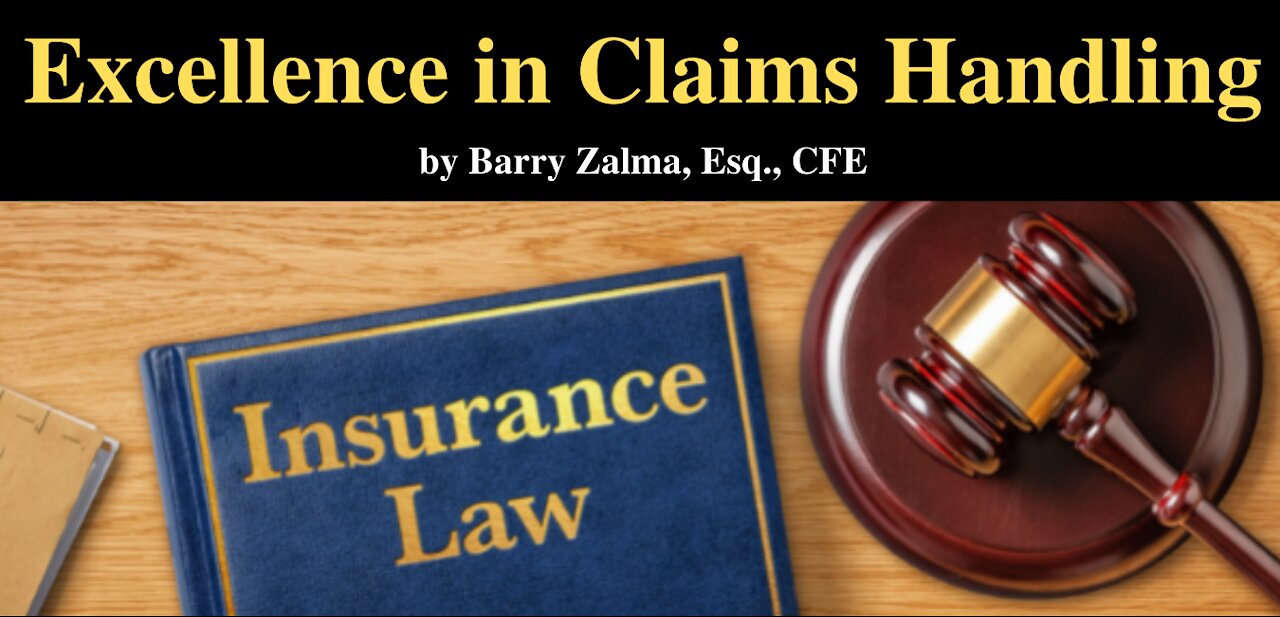Premium Only Content

Excellence in Claims Handling
A Series of Video Presentations and Text on Insurance Claims
Go to “Excellence in Claims Handling” and subscribe at https://barryzalma.substack.com/welcome and go to https://zalmaoninsurance.locals.com/subscribe subscribe to my locals account. See the introductory video at
Professional Insurance Adjusting
At the turn of the century, insurers, in a search for profit, decimated their professional claims sta. They laid off experienced personnel and replaced them with young, untrained and unprepared people.
A virtual clerk replaced the old professional claims handler. Process and computers replaced skill and judgment.
Insurers intentionally forgot that the promises made by an insurance policy are kept by the professional claims person. A professional claims staff is a cost-effective method to avoid litigation.
The professional claims person is an important part of the insurer's defense to litigation against insurers for breach of contract.
A staff of claims professionals dedicated to excellence in claims handling are a profit center for an insurance company. Experience establishes that claims professionals resolve more claims for less money without the need for either party to involve counsel. A happy insured or claimant satisfied with the results of his or her claim will never sue the insurer.
Incompetent or inadequate claims personnel force insureds and claimants to lawyers. Every study performed on claims establish that claims with an insured or claimant represented by counsel cost more than those where counsel is not involved.
Prompt, effective and professional claims handling saves money and fulfills the promises made when the insurer sold the policy.
Insurers who believe they can handle first or third-party claims with young, inexperienced and inexpensive claims handlers will be faced with the screams of angry stockholders. Profits, thin as they are, will move rapidly into negative territory. Punitive damages as punishment for bad faith claims handling will deplete reserves. Insurers will quickly question why they are writing insurance. Those who stay in the business of insurance will either adopt a program requiring excellence in claims handling from every member of their claims staff, or they will fail.
Insurance is a business. It must change if it is to survive. It must rethink the firing of experienced claims staff and reductions in training to save “expense.”
Excellence in Claims Handling
Excellence in claims handling is a program that can help insurers avoid charges of bad faith in both first and third party claims.
An insurer must understand that it cannot adequately fulfill the promises it makes to it insured and the Fair Claims Practices Act which exist in almost every state, when dealing with claimants without excellence in claims handling. An insurer must work intelligently and with vigor to create a professional claims department.
Insurance Claims Professionals Are
People who can read and understand the insurance policies issued by the insurer.
They understand the promises made by the policy and their obligation, as an insurer’s claims staff, to fulfill the promises made.
They are all competent investigators.
They have empathy and recognize the difference between empathy and sympathy.
They understand medicine relating to traumatic injuries and are sufficiently versed in tort law to deal with lawyers as equals.
They understand how to repair damage to real and personal property and the value of the repairs or the property.
An insurer whose claims staff is made up of people who are less than Insurance Claims Professionals will be destroyed by expensive and counter-productive litigation.
A Proposal to Create Claims Professionals
To avoid claims of bad faith; to avoid punitive damages; to avoid losses; and to make a profit insurers must maintain claim staffs who are dedicated to excellence in claims handling. That means they will make sure every promise made in every policy is satisfied by the:
Insurers who only hire insurance claims professionals.
Insurers who train the claims staff to be insurance claims professionals.
Insurers who require that the claims staff treat every insured with good faith and fair dealing.
Insurers who demand excellence in claims handling from the claims staff.
The insurance industry for the last 25 years has decimated the number of insurance claims professionals for insurers to hire.
If any experienced claims professionals exist in the insurer’s staff, the insurer must cherish and nurture them. If none are available, the insurer has no option but to train its people.
Those who treat all insureds and claimants with good faith and fair dealing and provide excellence in claims handling must be honored with increases in earnings and perquisites.
The insurer must immediately eliminate those who do not provide excellence in claims handling from the claims staff.
What Sources Are Available to Obtain Training?
Insurance training is available across the country by correspondence, in local colleges and universities and from law firms that will provide the training as a marketing tool. None of these sources are directed to producing insurance claims professionals. They do provide the basic background information necessary to begin the process of becoming an insurance claims professional. In that regard, I have created electronic training programs on professional claims handling that are available from experfy.com and a different set of courses from illumeo.com.
An excellence in claims handling program can include a series of web-based lectures supported by text materials like my claims books available at amazon.com and over the insurance claims library at my web site at https://zalma.com.
The web lectures must be supplemented by meetings between supervisors and claims staff on a regular basis to reinforce the information learned in the lectures.
In addition, the insurer must institute a regular program of auditing claims files to establish compliance with the subjects studied. There is no quick and easy solution. The training takes time. Learning takes longer. The insurer’s management must support and reinforce the training regularly.
The excellence in claims handling program requires a minimum of the following:
The insurance policy — how to read and understand the contract that is the basis of every adjustment.
The formation of the insurance policy.
Tort law including negligence, strict liability in tort, and intentional torts.
Contract law including the insurance contract, the lease agreement, the bill of lading, non-waiver agreements, proofs of loss, releases and other claims related contracts.
The duties and obligations of the insured in a personal injury claim.
The duties and obligations of the insurer in a personal injury claim.
The duties and obligations of the insured in a first-party property claim.
The duties and obligations of the insurer in a first-party property claim.
The Fair Claims Practices Act and the regulations to enforce it.
The thorough investigation.
Basic investigation of an auto accident claim.
Basic investigation of a construction defect claim.
Basic investigation of a non-auto negligence claim.
Basic investigation of a strict liability claim.
Basic investigation of the first-party property claim.
The recorded statement of the first-party property claimant.
The recorded statement or interview of a third-party claimant.
The recorded statement of the insured.
The red flags of fraud.
The SIU and the obligation of the claims representative when fraud is suspected.
Claims report writing.
The evaluation and settlement of the personal injury claim.
How to retain coverage counsel to aid when a coverage issue is detected.
How to control coverage counsel.
How to retain an expert.
How to control the expert.
Dealing with a plaintiffs’ lawyer.
Dealing with personal injury defense counsel.
The evaluation and settlement of the property damage claim.
Arbitration and mediation and the claims representative.
It Takes Courage to Fight Insurance Fraud
The legislatures of the various states, the United States Congress, the National Association of Insurance Commissioners, The National Insurance Crime Bureau and insurance
industry groups have finally decided that the war against insurance fraud is worth fighting.
Until the states, the local police agencies, the district attorneys, the United States Attorneys, and the Attorneys General of the various states join in the battle it will be fought to a stalemate. The insurance industry cannot successfully fight insurance fraud alone.
Insurance industry sources estimate insurance fraud from lows of $80,000,000,000 ($80 billion) a year to highs of $300,000,000,000 ($300 billion) a year. Regardless of which, if any, estimate is accurate the amount of money going to insurance criminals is staggering and approaches no less than 3% to 10% of premium collected.
Every two weeks Zalma’s Insurance Fraud Letter publishes lists of convictions. The major volume of such convictions deal with Medicare and Medicaid fraud. Basic property and casualty fraud convictions are seldom described except when the perpetrator confesses or pleads guilty. Few go to trial. Those who are convicted usually are sentenced to short stays in jail or to home confinement.
Proposal
Insurance fraud is not a local problem. It is a depletion of the wealth of the entire country. The lawyer for the Department of Insurance of each state is the State Attorney General. A special unit could be established in the office of the Attorney General, funded with the monies taken from the insurance industry to support the war against insurance fraud. This unit should be given a simple mandate:
File and prosecute every insurance fraud brought to the unit by the Fraud Division that has a better than 50% chance of success.
The unit should not concentrate its efforts on major insurance frauds. Those can best be prosecuted by major fraud units already existing in the District Attorney’s offices and in offices of the US Attorney.
The state’s unit should concentrate on prosecuting every-day insurance fraud, the frauds of opportunity that take 90% of the money paid to fraud perpetrators, in the range of $5,000 to $50,000.
Single counts should be prosecuted. When prosecutors file multiple charges against individual defendants the case becomes a major action requiring a great deal of time to prosecute. Judges and juries do not want to be involved in a prosecution that takes months to prosecute.
If there are multiple counts available, the prosecutor should charge only the one where the evidence of fraud is overwhelming. If the jury finds for the defendant the prosecutor can charge the next count continuously until the statute of limitation runs.
If all available are charged in one case the prosecutor will offend the judge and jury and the defendant will get mercy from the jury. Overcharging prosecution is as bad as not charging at all.
Teeth must be put in the posters that say “commit insurance fraud, go to jail.” Departments of Insurance are receiving reports from insurers of thousands of potential fraudulent claims a month. They do not have the staff, the ability or the desire to investigate and prosecute every case brought to them. If only 5 percent of those claims are investigated and prosecuted to conviction, the deterrent effect will be enormous. The Department of Insurance should issue a press release concerning every arrest and
conviction. Newspapers should report daily that insurance criminals have been arrested and are going to trial or were convicted and are going to jail. Jail sentences should be made mandatory and remove from local judges the right to grant convicted felons probation and restitution only.
Sentences across the state must be consistent and true punishment. I have seen such inconsistency where cases, after conviction, the criminals received sentences that ranged from 24 hours to 24 years.
It is not enough for the state to say that the insurance companies must investigate and work to fight fraud. The state must also aggressively and vigorously fight insurance fraud.
Today, a person perpetrating an insurance fraud need only be concerned that an aggressive fraud investigation might delay, or reduce, the amount he might recover from his crime. Criminal prosecution for the crime of insurance fraud is so minuscule, in relation to the amount of fraud, as to be nonexistent. It certainly does not act as a deterrent. In conjunction with the formation of a special insurance fraud prosecution unit in the attorney general’s office, the legislatures should enact the following statutes:
As of the effective date of this statute there is no tort of bad faith in this state.
Punitive damages may not be awarded in this state.
Any insurer that, without malice, reports to the Fraud Division, Department of Insurance that it has rejected a claim because of fraud may not be sued in any court of this state, for any tort cause of action.
This section is not intended to eliminate the right of any insured to sue its insurer for breach of the insurance contract.
If the legislatures really want insurers to fight insurance fraud; if the legislatures wish to keep strong and viable this important industry; if the legislatures want to reduce the insurance premiums paid by their constituents, they must make practical the war on insurance fraud. As long as the tort of bad faith and the exposure of punitive damages hangs over insurance companies, the war will be one of attrition where no one will win.
The stories I have fictionalized in this book were written to show how insurance fraud is taking money out of the pockets of innocent and honest people who buy insurance. For every dollar taken by a fraud an insurer must collect two dollars in premiums. Every person in the US who does not commit fraud is paying to support those who do. A minimum of $20.00 for every $100.00 every person insured pays in premiums goes into the pockets of insurance criminals. If the stories in this book make the reader angry, write to your local District Attorney, States Attorney, Attorney General or US Attorney and let them know of your anger.
If enough people complain perhaps, the prosecution levels will increase. Although each of the stories in this book are based in fact, the names, locations and facts of the claims have been changed to protect the guilty. No resemblance to any person, except those specifically named, is intended and any resemblance is purely coincidental.
© 2021 – Barry Zalma
Barry Zalma, Esq., CFE, now limits his practice to service as an insurance consultant specializing in insurance coverage, insurance claims handling, insurance bad faith and insurance fraud almost equally for insurers and policyholders.
He also serves as an arbitrator or media
tor for insurance related disputes. He practiced law in California for more than 44 years as an insurance coverage and claims handling lawyer and more than 54 years in the insurance business.
Subscribe to "Zalma on Insurance" at https://zalmaoninsurance.locals.com/subscribe and "Excellence in Claims Handling" at https://barryzalma.substack.com/welcome.
You can contact Mr. Zalma at https://www.zalma.com, https://www,claimschool.com, zalma@claimschool.com and zalma@zalma.com . Mr. Zalma is the first recipient of the first annual Claims Magazine/ACE Legend Award.
You may find interesting the podcast "Zalma On Insurance" at https://anchor.fm/barry-zalma; you can follow Mr. Zalma on Twitter at; you should see Barry Zalma's videos on YouTube- https://www.youtube.com/channel/UCysiZklEtxZsSF9DfC0Expg; or videos on https://rumble.com/zalma. Go to the Insurance Claims Library – https://zalma.com/blog/insurance-claims-library/ The last two issues of ZIFL are available at https://zalma.com/zalmas-insurance-fraud-letter-2/
-
 8:57
8:57
Barry Zalma, Inc. on Insurance Law
11 months agoNo Coverage for Benefits no Right to Bad Faith Damages
186 -
 16:49
16:49
Dave Portnoy
2 hours agoDavey Day Trader Presented by Kraken - January 3, 2025
11.3K3 -

Matt Kohrs
7 hours agoTesla Falls, Nvidia Bounces & Payday Friday || The MK Show
17.8K4 -
 1:33:19
1:33:19
Tactical Advisor
2 hours agoThe Vault Room Podcast 007 | Terrorist Attacks Update
13.1K1 -
 1:45:30
1:45:30
Game On!
11 hours ago $1.14 earnedNotre Dame proves that the SEC is the WORST conference in college football!
11.9K4 -
 1:49:52
1:49:52
Jeff Ahern
2 hours ago $1.34 earnedFriday Freak out with Jeff Ahern ( The Dr Michael Schwartz interview)
14K2 -
 15:04
15:04
Misha Petrov
21 hours agoThese Leftist Tattoos Are UNHINGED!
24.7K79 -
 8:27
8:27
Dr. Nick Zyrowski
1 day agoWhat to Eat After Fasting - This Diet Heals You!
50.9K13 -
 15:15
15:15
Chris From The 740
14 hours ago $1.77 earnedThe C&H Precision Comp Is The SRO Alternative You've Been Waiting For
29K7 -
 24:02
24:02
Bek Lover Podcast
1 day agoAmerica Under Attack - Danger In Every State?
23.6K15